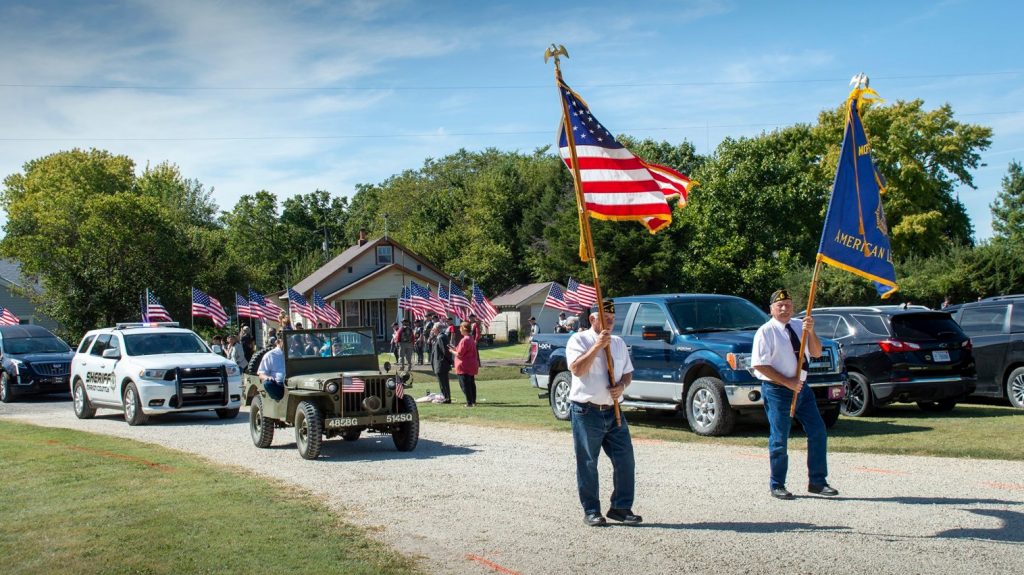Deacon Liam O’Shea-Creal remembers attending memorial services with military honors growing up, looking down the pews, and never seeing a dry eye. He was taught to shake a hand firmly, to show respect, and to let someone in a veterans hat pass him in line.
“I get goosebumps thinking about [Veterans Day],” said O’Shea-Creal. “It’s a powerful day.”
Likewise, Veterans Day reminds Deacon Bradley Easterbrooks of the Navy families he served alongside in Japan, and the sacrifices of all service members and their families.
“Veterans day is a reminder and a celebration of the goodness and the sacrifices service members and their families make for their country to keep us safe at home, and to protect our interests abroad as a nation,” Easterbrooks said.
The reverence O’Shea-Creal and Easterbrooks have for veterans – and all service members – is rooted in their family histories. Their histories also inspired them to serve, so when they were called to the priesthood they knew early on that military chaplaincy was the path to take.
O’Shea-Creal and Easterbrooks were ordained as deacons earlier this year. Upon their ordination into the priesthood, they’ll serve their home dioceses for three years before going active duty with the military as chaplains, part of the co-sponsorship program agreement between their home dioceses and the Archdiocese for the Military Services.
They’re two of the 39 Archdiocese for the Military Services co-sponsored seminarians.
“I’m incredibly eager to return to the Navy,” Easterbrooks told Crux. “Every day that I put on the naval uniform was a day that I felt privileged to serve my country and so when it’s time to put on the uniform and serve as a priest on active duty I’ll experience it as a great blessing.”
Easterbrooks is native to the Diocese of San Diego. He studied political science at Boston College, and eventually made his way to the Pepperdine University Caruso School of Law where he graduated in 2012, and subsequently passed the California Bar Exam.
Easterbrooks said he always had an inkling to serve the country out of admiration for his grandfathers who served in World War II. While in law school, he realized serving in the Judge Advocate General’s Corps (JAG) allowed him to fulfill that desire to serve the country and utilize his skills as an attorney. It was also in law school when he returned to his Catholic faith.
Easterbrooks served the Navy as an attorney for about five years (2012-2017). During that span his relationship to Christ grew “deeper and deeper,” and he began to discern the possibility of a call to the priesthood. Later on, while stationed in Japan, the absence of a Catholic chaplain on a base of thousands of active-duty service members was further inspiration because he “saw a need.” He then began to serve the base’s Catholic community as a youth group coordinator and catechist for high schoolers, which sealed the deal.
“That helped me see that while I truly enjoyed being a lawyer, I got an even greater joy out of serving people in the Catholic community at the chapel,” Easterbrooks said.
Easterbrooks entered the seminary in the Diocese of San Diego in 2017 co-sponsored by the Archdiocese for the Military Services. The Diocese of San Diego sent him to North American College in Rome, where he’s been since. In the military, he holds the rank of Lieutenant Junior Grade in the U.S. Naval Reserve, pending his return to active duty.
“Serving them first as an attorney was a privilege and honor and it will be an even greater privilege and honor to serve military service members and their families as a priest and as a teacher,” Easterbrooks said.
O’Shea-Creal’s call to military chaplaincy was less linear. The second youngest of five children, he comes from a faithful Catholic family in Lincoln, Nebraska. After high school, he enrolled at the University of Nebraska, where early on his “faith took a backseat.” By year two, however, his faith was reinvigorated through the University’s Newman Center for Catholic students.
O’Shea-Creal eventually decided to take a year off from his studies after his second undergraduate year “to figure out what God’s doing” in his life.
“As I kind of opened the door there, where I stopped making my own plans and let other plans come to me, God started to open the doors to college seminary and all of the sudden I found myself embracing the idea of enrolling in a seminary,” O’Shea-Creal told Crux.
O’Shea-Creal wound up at Mount St. Mary Seminary in Emmitsburg, Maryland, where he began considering military chaplaincy in the context of his family’s history of service – his father was a marine, two of his uncles were pilots during the Vietnam War, and his grandfathers were navy sailors.
“There’s definitely a desire to serve and a respect for those who have served,” he said.
He discerned the possibility with his vocations director, who had him write a letter to Bishop James Conley of Lincoln, wait a year, update it, and then send it if he felt the same. Nine months later O’Shea-Creal had an eight-hour long car ride across Nebraska with Conley and used the opportunity to present why he wanted to be a military chaplain, and the rest was history. Conley granted O’Shea-Creal permission to pursue commissioning in the navy as a chaplain candidate in October 2019. O’Shea-Creal became an official candidate in January 2020.
Now in the thick of his own journey to military chaplaincy, O’Shea-Creal notes that Veterans Day is also special for honoring historic Catholic chaplains like Father Emil J. Kapaun, Father Vincent R. Capodanno, and Father Joseph Verbis Lafleur, all of whom died during their service and are now being investigated as potential saints.
“They’re servants of God in the eyes of the church so [today’s] kind of another day to remember them and to intercede through them even more to maybe spread their stories as both veterans and future saints of the church,” he told Crux.

